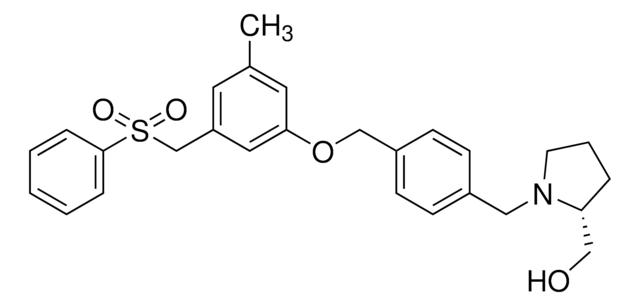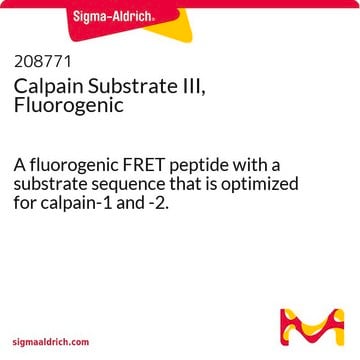567731
Sphingosine Kinase Inhibitor
The Sphingosine Kinase Inhibitor, also referenced under CAS 1177741-83-1, controls the biological activity of Sphingosine Kinase. This small molecule/inhibitor is primarily used for Cell Signaling applications.
Synonym(s):
Sphingosine Kinase Inhibitor, 2-( p-Hydroxyanilino)-4-( p-chlorophenyl) thiazole, HCl, SK Inhibitor I, 2-(p-Hydroxyanilino)-4-(p-chlorophenyl) thiazole, HCl, SK Inhibitor I
About This Item
Recommended Products
Quality Level
Assay
≥98% (HPLC)
form
solid
manufacturer/tradename
Calbiochem®
storage condition
OK to freeze
desiccated (hygroscopic)
protect from light
color
white
solubility
DMSO: 5 mg/mL
shipped in
ambient
storage temp.
2-8°C
InChI
1S/C15H11ClN2OS.ClH/c16-11-3-1-10(2-4-11)14-9-20-15(18-14)17-12-5-7-13(19)8-6-12;/h1-9,19H,(H,17,18);1H
InChI key
ZDRVLAOYDGQLFI-UHFFFAOYSA-N
General description
Biochem/physiol Actions
GST-hsk
Packaging
Warning
Reconstitution
Other Notes
Legal Information
Storage Class Code
11 - Combustible Solids
WGK
WGK 1
Certificates of Analysis (COA)
Search for Certificates of Analysis (COA) by entering the products Lot/Batch Number. Lot and Batch Numbers can be found on a product’s label following the words ‘Lot’ or ‘Batch’.
Already Own This Product?
Find documentation for the products that you have recently purchased in the Document Library.
Our team of scientists has experience in all areas of research including Life Science, Material Science, Chemical Synthesis, Chromatography, Analytical and many others.
Contact Technical Service








